Floor Screeding Headley Down Hampshire (GU35): If you find yourself engaged in property or basement renovation, addressing an uneven or damaged floor, or exploring underfloor heating installation in your Headley Down home, it is crucial to rely on the proficiency of a floor screeding specialist. The goal of screeding is to achieve a seamless and even surface above a concrete sub-base, offering a firm base for your preferred flooring material. This important system produces a sturdy and premium finish for the complete floor structure, guaranteeing its robustness and permanency. With a floor screeding specialist at your side, you can confidently expect the attainment of a flawless and enduring floor surface that fulfils your unique requirements.
FLOOR SCREEDING COMPANIES HEADLEY DOWN
A dependable floor screeding company in Headley Down will have know-how and experience to help you achieve a perfect floor in whichever size or shape of room you are working on. After analyzing your project they'll give you advice on the optimal choice of screed and which technique for applying it is most suited to your situation.
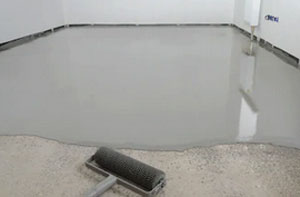
A professional screeding company will also tell you if a structural engineer is necessary for your undertaking, in order to identify flex strength, point loadings and load bearing that your screed floor might need to conform with current building regulations and British Standards.
The training and skills that a qualified screeding technician brings to your project should guarantee a successful end result and help to lengthen the life of your floor or floors. Selecting the correct screeding materials and the best installation technique is critical if you want a durable and quality finish for your floor.
Make sure you get at least 2 or 3 quotations for your Headley Down based floor screeding project and also ask what standard of finish each quote is for. The quotation could be based on what's known as the Surface Regularity, or SR figure. Each of the three SR levels provide different standards of finish, with SR1 offering the best, with the least amount of deviation over the area of the floor. An SR2 or SR3 standard may mean there are ridges or flat spots that may cause issues when laying your final flooring surface (tile, carpet, wood etc).
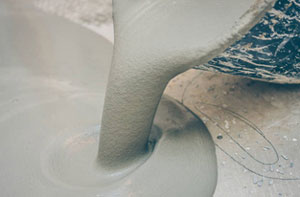
The regulations and guidelines laid down in the British Standards BS8204 have to be observed by all Headley Down floor screeding companies and they must also hold accreditation with the manufacturers of specialist screeding materials (Cemfloor, Flowcrete, Gypsol etc.) to demonstrate their safe working practices and competence. The training and testing of a screeding company by a manufacturer is emphasised through this accreditation scheme, and guarantees safe working practices and reliability on any project which involves their materials.
For larger screeding projects in boutiques, shopping centres, warehouses, factories, schools and hospitals, dedicated commercial screeders in Headley Down will be required.
TYPES OF SCREED
Standard Screeds - A mixture of cement and sand which is perfect for normal domestic usage. The standard screed is a mix of 5 parts sand to one of cement. Once its been laid this 5:1 ratio dries at a rate of 1mm each day.
Polymer Screeds - An extremely high strength solution where a reduced screed thickness is necessary. The drying times vary in accordance with proprietary product guidelines.
Self-Levelling or Liquid Screeds - When a high standard of finish is needed this compound of latex and cement is used to create SR1 level floor screeding. It is mostly needed to provide a clean, smooth floor over the top of a damaged or poor quality substrate and results in a surface finish onto which all kinds of flooring materials can be laid. Even with a thickness of only 1mm, the latex polymers within the mixture provide a high strength surface for a variety of uses.
Industrial and Heavy Duty Screed - Where traffic levels are expected to be high or heavy loading on the floor is required, heavy duty screeds allow for maximum durability and strength.
Fast Drying and Advanced Drying Screeds - If there is a need to use the floor at the earliest opportunity a fast drying screed can be employed. Drying at a rate of 3-7mm, depending on the mixture, they're generally a fibre reinforced screed and are great for projects which have tight deadlines.
Fibre Reinforced Screed - Used with under floor heating systems and is the recommended option in such projects. This is because of the improved durability and protection against thermal shrinkage and cracking offered by the special fibres within the screed. The screed will dry out at a rate of 1mm/day.
SCREEDING PREPARATION AND INSTALLATION
To make certain that the screeding is of a good quality finish which is hard wearing and durable, time should be devoted to carefully preparing the area before any screed is poured. Any grease, oil, debris and paint on the original floor surface can affect the adhesion of the screed, and should be removed.
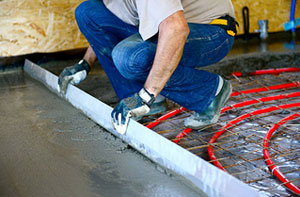
If any cleaning products were used during this stage it is important to make sure that no residues of soaps, detergents or other cleaning products are left on the surface and it is allowed to dry out naturally. At this point cracks need to be repaired as these can easily travel up through the laid screed and be visible in the finished floor surface. A site survey will allow your Headley Down screeding installer to take note of this preparation work and tackle it before starting to pour the screeding.
A DPM (damp proof membrane) will be installed once the preparation work has been finished to prevent ground moisture getting into the flooring materials and screeding. Different thicknesses of polythene sheets could be used as a DPM and also serve as a buffer for the screed and any insulation material.
If the area where you live is at risk from radon gas then one additional barrier is required to stop this harmful gas from entering from the ground. If radon gas is present in large amounts then a full ventilation system might be needed underneath the layer of screed which will remove any gases that might seep in from ground level.
Once the floor base has been prepared and any membranes installed, a primer or sealer is then put on. A primer helps with the screed to bond to the base surface and different varieties exist based upon which type of screed is being used. Equipment such as airless sprays are used to apply a primer or sealant, by certified screeding companies in Headley Down observing the manufacturer's guidelines.
Underfloor heating can now be laid out, installed and tested before screeding is poured. The under floor heating system will be carefully positioned and mounted firmly on insulation panels to avoid any movement during screed application. Underfloor heating is one of the most effective ways to heat a room and a properly installed system will produce even warmth across the floor area.
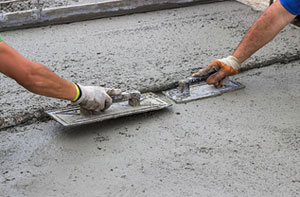
Of course, if you aren't installing under floor heating, you simply bypass this step and apply the screed. Your proposed use of the room will assist the screeding specialist on what type of floor screed is perfect for your needs. Remember that even quick drying and advanced screeds have a minimum of 24 hours before you are able to walk over any laid surface and a minimum seventy two hours before any flooring materials can be fitted. If you're aiming to wind up with a properly finished and hard-wearing floor surface you should follow the manufacturer's guidelines with regard to heavy duty and standard screeds where the time period will be longer.
Once the screeding has set it can be quality checked to confirm its SR level. Using a 2m straight-edge the floor surface is checked for any deviations, ridges and dips in the screed surface.
- SR1 - SR1 is the best level and allows only three millimetres of disparity from the straight-edge.
- SR2 - The standard flooring in commercial and industrial builds is classed as SR2 and has a maximum deviation of 5mm across the entire floor.
- SR3 - For a utility area or room where the finish is relatively immaterial SR3 is the classification and has a maximum deviation measurement of 10mm or less.
There might also be a requirement for a qualified structural engineer to carry out a soundness test. Using specialist equipment the structural engineer will establish the screeded surface strength and its suitability for use in a load bearing environment. The screed layer could be subjected to a drop hammer test to measure flexibility and strength in different areas. The precise measurement and testing tools mean that this can only be conducted by a competent structural engineer obeying the BS8204 guidelines. (Tags: Screeding Headley Down, Floor Screed Headley Down, Floor Screeding Services Headley Down, Floor Screeding Headley Down).
Floor screeding is available in Headley Down and also in nearby places like: Deadwater, Grayshott, Hollywater, Churt, Passfield, Bramshott, Frith End, Headley, Standford, Hearn, Lindford, Arford, Green Cross, Dockenfield, Cold Ash Hill, and in these postcodes GU35 8NN, GU35 8EQ, GU35 8AT, GU35 8HD, GU35 8ET, GU35 8BW, GU35 8BQ, GU35 8HY, GU35 8EY, and GU35 8DS. Locally based Headley Down floor screeders will most likely have the postcode GU35 and the phone code 01428. Checking this out should ensure that you access locally based screeding. Headley Down householders are able to utilise these and countless other comparable services. To make enquiries and obtain quotations for screeding, simply click the "Quote" banner.
Screed Reinforcement
The application of screed reinforcement is a means of enhancing the strength and durability of concrete screeds. A base layer is covered with flat and thin layers of concrete, called screeds, to create a level surface. They're commonly used in building projects for flooring, and can also be used as a finishing layer for walls and ceilings.
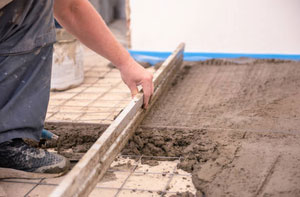
Screed mixture during installation is infused with reinforcement materials, such as wire, steel mesh or fibres, to increase strength and prevent cracking. Reinforcement aids in the even distribution of load and weight on the surface, while also improving its resistance to impact, thermal changes and abrasion.
The reinforcement of screeds decreases the risk of cracking and shrinkage caused by temperature or humidity changes, in addition to increasing their durability and strength. Factors such as load capacity, finish and thickness play a role in the selection of screed reinforcement material for a project, which can vary according to specific requirements. The correct installation of the reinforcement is crucial to guarantee uniform distribution throughout the screed and avoid displacement over time. The quality and structural integrity of screeds can be maintained through the use of screed reinforcement, ensuring a reliable and long-lasting surface for various applications.
Granolithic Screeding Headley Down
Granolithic screeding is an extremely popular flooring material that is commonly used in heavy-duty environments because of its durability and strength. It is made from a mixture of cement, sand, aggregate, and sometimes pigments, which are combined to make a mortar-like mixture. The mixture is poured onto the floor and then smoothed out to an even, level surface.
Granolithic screeding is generally used in industrial and commercial buildings and also in high-traffic areas in residential buildings. It is also commonly used in areas where chemical and abrasion resistance are required. The resulting surface is smooth and hard, which makes it easy to maintain and clean, and provides an excellent base for other flooring materials.
Granolithic screeding is typically applied over a concrete sub-base, and the surface is usually treated with a curing compound to make sure it sets correctly. As soon as it has cured, it creates a seamless floor with a hard, smooth surface that is resistant to wear and tear. It is also resistant to water and chemicals, which makes it ideal for use in environments where there's a risk of spills or exposure to hazardous materials.... READ MORE.
Multi-Coloured Floor Screeds
Coloured screeds are a flooring material that is commonly used in industrial or commercial settings. These screeds are made up of a combination of coloured aggregates, resins, and sealants that are blended together to create a unique and distinctive finish. Due to their slip resistance and durability, they are frequently employed in areas with heavy footfall or machinery.
By customising multi-coloured screeds, a particular aesthetic can be achieved in a space or the brand of a business can be matched. Facilities that demand a high level of hygiene often prefer them due to their simple maintenance and cleaning requirements. The seamless finish that multi-coloured screeds offer, eliminating grout lines or joints, makes them an ideal flooring solution for cleanrooms and similar environments. Overall, coloured floor screeds are a flooring solution that can add function and style to any industrial or commercial space, making them a versatile and practical choice.
What Does Screeding Do?
Screeding serves several important purposes in construction projects:
- Structural Integrity and Stability.
- Improving Thermal and Sound Insulation.
- Subfloor Corrections.
- Compatibility with Floor Finishes.
- The Even Distribution of Loads.
- Surface Protection.
- Underfloor Heating System Support.
- Smoothing and Levelling.
All in all, the vital role of screeding is to create a durable, level and stable floor surface. By ensuring a solid foundation, it supports the floor finish in maintaining its quality and aesthetics, and enduring the demands of everyday use for many years to come.
Screed Floor Removal Headley Down
Screed floor removal is used in renovation and construction to strip away existing screed layers from floor surfaces. This is an important process. This procedure is essential when upgrading or refurbishing a floor, as it facilitates the preparation of the surface for new flooring or other modifications.
The removal of screed floors is an intricate task that should only be attempted by specialist contractors who've got the necessary expertise. Their competence ensures that the old screeding can be eliminated safely and efficiently, preparing the way for a fresh start for your floor. This fresh start holds immense significance, whether it's for repairs, upgrades or changes in design.
The process of removing a screed floor involves the use of specialised techniques and equipment that are adapted to the particular requirements of the job. The assessment should encompass the screed's thickness, type, and the surface it's being applied onto. Such attention to detail ensures that the removal is carried out successfully, with minimal disruption to the underlying structure.
One of the main benefits of removing screed floors is that it allows you to deal with any underlying problems that may have developed over the years. A thorough examination of the underlayer is possible only after removing the old layer of screed, if it's uneven, damaged, or compromised. New flooring materials can be safely installed after flooring specialists have completed this assessment and rectified any structural challenges. (22264 - Floor Screed Removal Headley Down)
Screeding Related Tasks

There is a range of work that can be undertaken by your local Headley Down floor screeding specialist including commercial screeding, sand and cement screed in Headley Down, thin bed floor screeding Headley Down, floor preparation, substrate floor preparation, cheap floor screeding Headley Down, concrete floor toppings Headley Down, unbonded screed, floor screed testing Headley Down, underfloor insulation, floor screed repairs, underfloor heating screeding Headley Down, polished floor screeding in Headley Down, latex screed Headley Down, bonded screed, floor noise reduction, floating screed, office floor screeding, final floor finishes, floor resurfacing, sand screed, polished screed floors, screed pump hire, flow screeding, conservatory floor screeding, lightweight screeding in Headley Down, coloured floor screeding Headley Down, screeded bathroom floors, screed floor removal in Headley Down, acoustic flooring solutions, subfloor repair in Headley Down, bonded concrete screeding, self-levelling screeding, granolithic floor screeds, floor levelling, and more floor screeding tasks. Listed are just a small portion of the tasks that are accomplished by those installing screeding. Headley Down specialists will be delighted to keep you abreast of their entire range of floor screeding services.
Floor Screeding Near Headley Down
Also find: Hearn floor screeding, Dockenfield floor screeding, Churt floor screeding, Bramshott floor screeding, Hollywater floor screeding, Headley floor screeding, Green Cross floor screeding, Arford floor screeding, Grayshott floor screeding, Deadwater floor screeding, Frith End floor screeding, Lindford floor screeding, Standford floor screeding, Passfield floor screeding, Cold Ash Hill floor screeding and more. Pretty much all of these towns and areas are covered by contractors who do screeding. To deliver top-notch flooring services, these seasoned professionals have the required expertise and know-how. They possess considerable skill in screeding, ensuring top-quality execution for both commercial and domestic properties. Local home and property owners can obtain screeding quotes by going here.
More: Screeding Contractors, Floor Screeding, Screeding, Commercial Screeding, Coloured Screeding, Cheap Screeding, Screeding Companies, Self-Levelling Screeds, Cheap Screeding, Flooring Contractors, Screed Floors, Screeding Specialists, Decorative Screeding, Decorative Screeding, Cheap Screeding, Screeding Companies, Self-Levelling Screeds, Decorative Screeding, Screeding Contractors, Polished Screeding, Screed Floors, Floor Screeders, Self-Levelling Screeds, Screed Flooring, Polished Screeding, Cheap Screeding, Screed Flooring, Floor Levelling, Self-Levelling Screeds, Cheap Floor Screeding, Screeding Services, Decorative Screeding, Screeding, Screed Reinforcement, Concrete Driveway Contractors, Driveway Contractors, Driveway Contractors.
TOP - Floor Screeding Headley Down
Domestic Screeding Headley Down - Floor Levelling Services Headley Down - Floor Screeding Services Headley Down - Self-Levelling Screeding Headley Down - Floor Screeding Near Me - Underfloor Heating Headley Down - Screeding Headley Down - Screeder Headley Down - Commercial Screeding Headley Down


